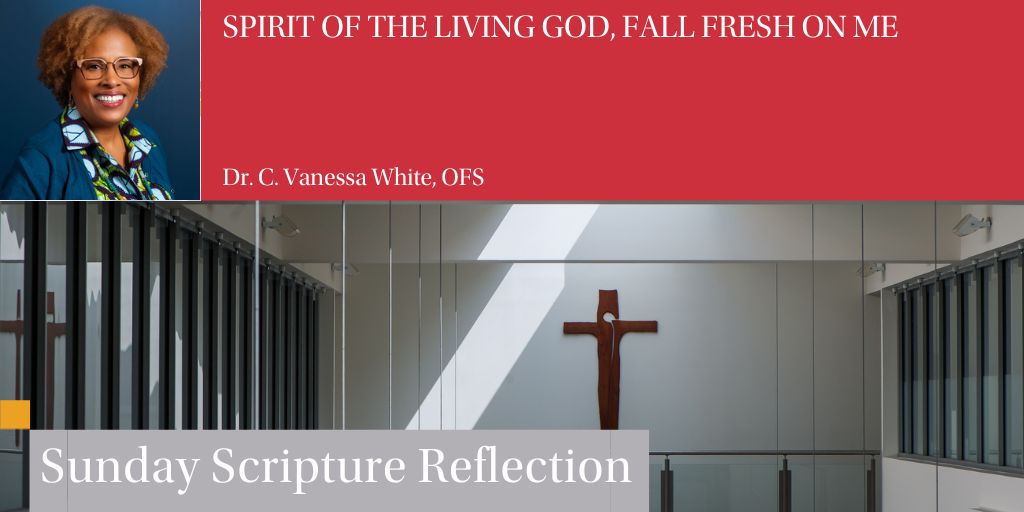

Readings:
Acts 7:55-60
Psalm 97:1-2, 6-7, 9
Revelation 22:12-14, 16-17, 20
John 17:20-26
Spirit of the Living God
Fall Fresh on Me
Spirit of the Living God
Fall Fresh on Me
Melt Me, Mold Me, Fill Me, Use Me
Spirit of the Living God, Fall Fresh on Me
This powerful song from the African American religious tradition—“Spirit of the Living God, fall afresh on me…”—speaks deeply to the believer’s faith in the transformative power of the Holy Spirit. It calls upon the Spirit to melt us, mold us, fill us, and use us—reminding us of how the Spirit works within and among us, changing hearts, minds, and actions.
As I reflect on this Sunday’s readings for the Seventh Sunday of Easter, I am reminded of that very song. So, what can we learn today from these sacred texts about this Spirit of the Living God?
In the Acts of the Apostles, the presence and power of the Holy Spirit are so profound—so central—that many scholars have referred to the book as the Gospel of the Holy Spirit. Indeed, in Acts, we see the Spirit at work: transforming a fearful community into a fearless one, turning faltering disciples into faithful witnesses, and empowering the powerless with passionate conviction.
In our first reading from the Acts of the Apostles, we encounter Stephen, filled with the Holy Spirit, who meets his accusers not with fear but with courage and unwavering faith. Even in the face of death by stoning, he radiates the presence of God. This is not human strength alone, this is the power of the Spirit.
In our second reading from the book of Revelation, John, also open to the Spirit, shares a vision of Jesus’ return. He proclaims his hope and declares with confidence that his sacrifices—and those of the faithful—will be rewarded. This spirit of hope and courage transformed the early followers of Jesus into an inclusive, missionary community—a church on fire with love and purpose. They didn’t remain behind closed doors. They went forth, proclaiming the Good News with boldness. Their transformation was rooted in prayer, communal worship, and openness to the Spirit’s movement.
Finally, in the Gospel of John, Jesus—praying in the Holy Spirit—asks that his disciples “may all be one.” He does not leave them alone—and neither are we abandoned. The Spirit remains our constant companion and guide, if we are open to receiving it. Through prayer, worship, and fellowship, we create space for the Spirit to enter our lives and equip us with the wisdom and strength we need to face the challenges of our time.
In this prayer, Jesus speaks of the unity of faith and the power of love—two gifts he deeply desires to impart to his disciples. His words are not just a reflection of his divine mission but a heartfelt hope that his teachings have taken root in the hearts of those who walked closely with him.
This prayer is tender, intimate, and deeply human. Jesus is about to meet his death, and in these final moments, he prays not for himself but for his disciples—that they may be one, just as he and the Father are one. He prays that the love with which the Father has loved him may be in them, and that this love may strengthen them for the mission ahead.
Jesus’ prayer is not only about doctrinal unity, but a unity grounded in love, truth, and purpose. He longs for his disciples to be bound together—not by fear, but by faith, not by sameness, but by shared love and commitment to the Gospel.
He hopes that what he has taught them—about compassion, service, humility, justice, and mercy—has truly entered their hearts. That it has formed them not only as followers, but as leaders who will carry forward the work he has begun. And he entrusts them, through this prayer, to the care and guidance of the Holy Spirit.
As we reflect on this moment of prayer, we are invited to ask ourselves:
- Has Christ’s message entered our hearts deeply enough to transform our lives?
- Are we open to the love that unites rather than divides?
- Do we live in a way that continues the mission of Jesus—with courage, compassion, and commitment?
May we, too, be one.
May we love with His love.
And may the unity for which Jesus prayed take root in our hearts, our communities, and our world.
But receiving the Holy Spirit also calls us to action. Like the first disciples, we are called to go forth—committed to justice and peace, testifying to the transforming power of God as revealed in the Gospel. We are not passive recipients, but active participants in God’s ongoing work of redemption in the world.
Today, as we continue God’s mission, we must ask ourselves:
How are we being moved to action and love in confronting the injustices of our time? How are we responding to the persistent sins of racism, sexism, homophobia, healthcare inequities, hunger, ecological destruction, war, and every system that threatens the dignity and sacred worth of all people?
And how are we answering Pope Francis’ and Pope Leo XIV call to be a synodal Church—a Church that walks together, that listens, and that always seeks peace, charity, and closeness—especially with those who are suffering?
The Holy Spirit does not merely comfort; it compels. It empowers us to speak truth, to build bridges, to stand in solidarity, and to live as witnesses to Christ’s reconciling love in a broken world.
As we await the coming of Pentecost, next week, let us ask ourselves:
- How are we preparing our hearts to receive the Holy Spirit today?
- Are we creating space through prayer, community, and worship?
- Are we ready to be molded, filled, and used for the purpose of fulfilling God’s mission?
May the words of the song be our prayer:
“Spirit of the Living God, fall afresh on me.
Melt me, mold me, fill me, use me…”
Like those first disciples, may we be open—truly open—to the Holy Spirit, that we too may be transformed and sent forth to renew our communities, our churches, and our world.
Amen.
Dr. C. Vanessa White, OFS